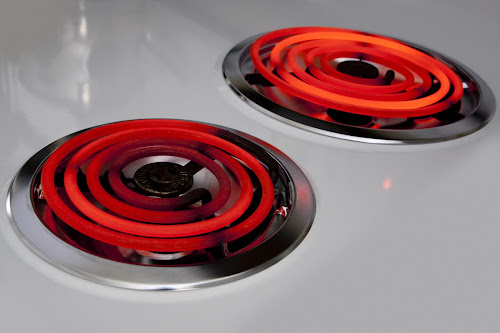Electric Cooktops; More Energy-Efficient Than Other Traditional Cooking Appliances
Electric cooktops, such as electric coil cooktops and glass
ceramic cooktops, are widely used in both commercial and non-commercial
settings. They provide enhanced safety features, such as automatically shutting
off, and are more energy-efficient than other traditional cooking appliances.
Materials, such as ceramic or glass, are used to build electric cooktops as
they are easy to clean, durable, and strong. They offer wide temperature range
(80‐450°F)
and different power level options to ensure precise temperature control.
Electric
cooktops work on the principles of electromagnetic induction, where heat is
produced directly from an electrically charged metallic surface. Induction
heating is done with direct electric heating of cooking vessel's, instead of
relying on indirect heat, convection, or air conduction. Induction heating
allows extremely quick and high temperature increases in heat, and constant
changes in heat settings can be achieved. In the past, electric cooktops were
quite expensive, as they required copper piping and electrical wiring to run
correctly. However, new advancements allow much lower cost implementation, and
modern cooktops now use simple insulating material to reduce electrical costs.
Electric cooktops offer a centralized heat for pans and pots.
Beneath the surface of ceramic or glass, there is an electric current that
flows through a metal coil, which then transfer its heat (using infrared
energy) through the ceramic or glass to heat pan or pot evenly by the
transmitted energy. The cooktop will remain hot for some time even after the
electric current has stopped. Today, most electric cooktops have an indicator
to show that the burner has cooled down. The advantage to this type of cooktop
is that food cooks at the same pace as it would do if cooked by other means,
and that the heat distribution is even.
With the increasing demand for energy-efficient appliances,
the demand for electric cooktops is also increasing with a rapid pace. For
instance, in January 2021, the U.S. Energy Information Administration (EIA)
forecasted that the annual natural gas price will rise 98¢ per million British
thermal units (MMBtu) to average US$ 3.01/MMBtu in 2021. This in turn is
expected to proportionally hike prices of domestic cooking gas. Thus, electric
cooktops are more energy-efficient than conventional ones.




Comments
Post a Comment